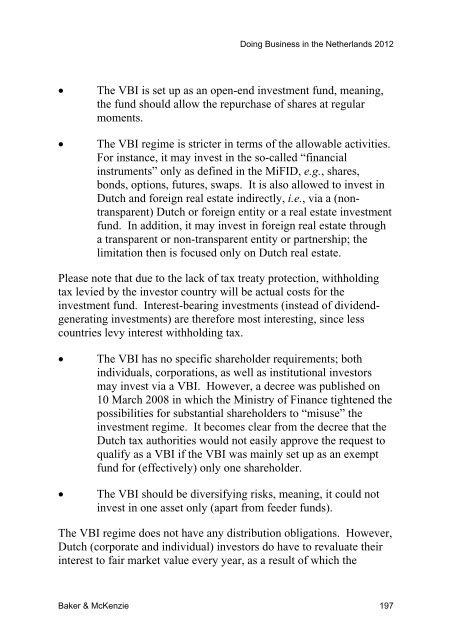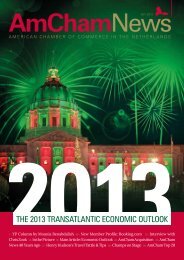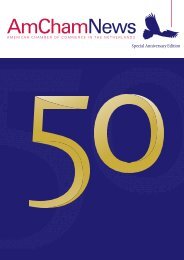Doing Business in the Netherlands 2012 - American Chamber of ...
Doing Business in the Netherlands 2012 - American Chamber of ...
Doing Business in the Netherlands 2012 - American Chamber of ...
You also want an ePaper? Increase the reach of your titles
YUMPU automatically turns print PDFs into web optimized ePapers that Google loves.
<strong>Do<strong>in</strong>g</strong> <strong>Bus<strong>in</strong>ess</strong> <strong>in</strong> <strong>the</strong> Ne<strong>the</strong>rlands <strong>2012</strong><br />
� The VBI is set up as an open-end <strong>in</strong>vestment fund, mean<strong>in</strong>g,<br />
<strong>the</strong> fund should allow <strong>the</strong> repurchase <strong>of</strong> shares at regular<br />
moments.<br />
� The VBI regime is stricter <strong>in</strong> terms <strong>of</strong> <strong>the</strong> allowable activities.<br />
For <strong>in</strong>stance, it may <strong>in</strong>vest <strong>in</strong> <strong>the</strong> so-called “f<strong>in</strong>ancial<br />
<strong>in</strong>struments” only as def<strong>in</strong>ed <strong>in</strong> <strong>the</strong> MiFID, e.g., shares,<br />
bonds, options, futures, swaps. It is also allowed to <strong>in</strong>vest <strong>in</strong><br />
Dutch and foreign real estate <strong>in</strong>directly, i.e., via a (nontransparent)<br />
Dutch or foreign entity or a real estate <strong>in</strong>vestment<br />
fund. In addition, it may <strong>in</strong>vest <strong>in</strong> foreign real estate through<br />
a transparent or non-transparent entity or partnership; <strong>the</strong><br />
limitation <strong>the</strong>n is focused only on Dutch real estate.<br />
Please note that due to <strong>the</strong> lack <strong>of</strong> tax treaty protection, withhold<strong>in</strong>g<br />
tax levied by <strong>the</strong> <strong>in</strong>vestor country will be actual costs for <strong>the</strong><br />
<strong>in</strong>vestment fund. Interest-bear<strong>in</strong>g <strong>in</strong>vestments (<strong>in</strong>stead <strong>of</strong> dividendgenerat<strong>in</strong>g<br />
<strong>in</strong>vestments) are <strong>the</strong>refore most <strong>in</strong>terest<strong>in</strong>g, s<strong>in</strong>ce less<br />
countries levy <strong>in</strong>terest withhold<strong>in</strong>g tax.<br />
� The VBI has no specific shareholder requirements; both<br />
<strong>in</strong>dividuals, corporations, as well as <strong>in</strong>stitutional <strong>in</strong>vestors<br />
may <strong>in</strong>vest via a VBI. However, a decree was published on<br />
10 March 2008 <strong>in</strong> which <strong>the</strong> M<strong>in</strong>istry <strong>of</strong> F<strong>in</strong>ance tightened <strong>the</strong><br />
possibilities for substantial shareholders to “misuse” <strong>the</strong><br />
<strong>in</strong>vestment regime. It becomes clear from <strong>the</strong> decree that <strong>the</strong><br />
Dutch tax authorities would not easily approve <strong>the</strong> request to<br />
qualify as a VBI if <strong>the</strong> VBI was ma<strong>in</strong>ly set up as an exempt<br />
fund for (effectively) only one shareholder.<br />
� The VBI should be diversify<strong>in</strong>g risks, mean<strong>in</strong>g, it could not<br />
<strong>in</strong>vest <strong>in</strong> one asset only (apart from feeder funds).<br />
The VBI regime does not have any distribution obligations. However,<br />
Dutch (corporate and <strong>in</strong>dividual) <strong>in</strong>vestors do have to revaluate <strong>the</strong>ir<br />
<strong>in</strong>terest to fair market value every year, as a result <strong>of</strong> which <strong>the</strong><br />
Baker & McKenzie 197





![912.025 AmCham News [1] - American Chamber of Commerce in ...](https://img.yumpu.com/9328612/1/190x127/912025-amcham-news-1-american-chamber-of-commerce-in-.jpg?quality=85)

